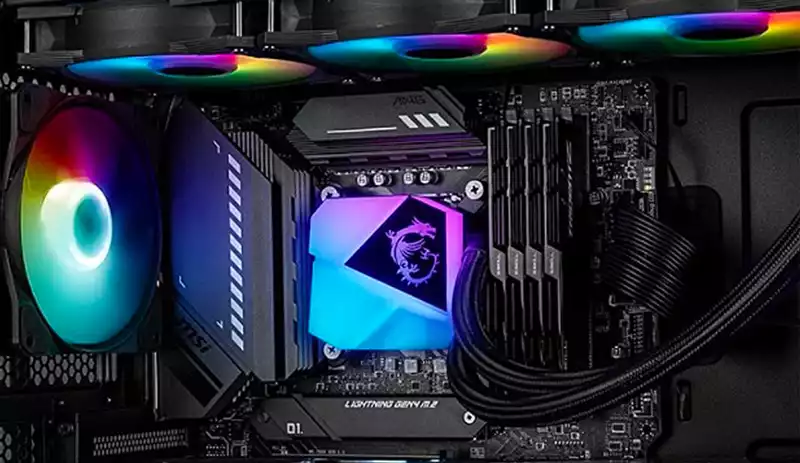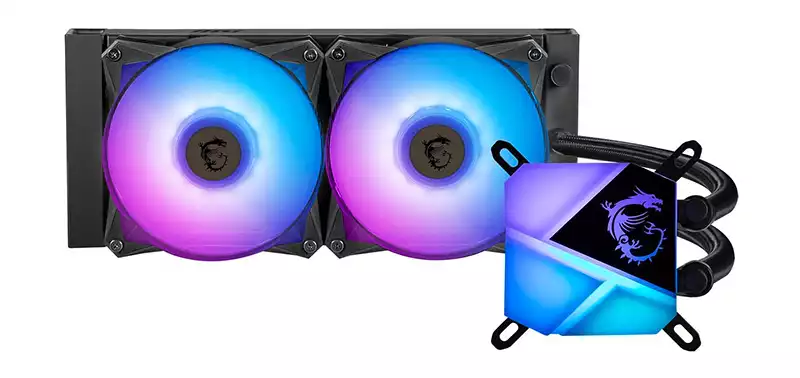You can also be interested in these:
- Comparison of the Z790 and Z690 Intel motherboard chipsets
- Intel B760 vs B660 chipset: Features and differences
- Who leads the battle of the CPUs in 2023?
- Seemingly all Intel Alder Lake CPU can be overclocked after all
Intel CPUs are some of the most popular processors on the market. They come in various models, each with its own set of features. If you’re looking to buy an Intel CPU and want to use liquid cooling, which one should you choose? This article will discuss the different Intel CPUs and which ones work best with liquid cooling. We’ll also provide some tips on installing liquid cooling for your Intel CPU.

What is liquid cooling, and why do people use it in their CPUs?
Liquid cooling is the process of using liquid to cool down your CPU. This is done by either using water that goes over your CPU or using a closed-loop system with a radiator and water pump. People use liquid cooling for their CPUs because it can help keep the temperatures down, which can help extend the life of your CPU.
Which Intel CPUs work better with liquid cooling?
There are a few different Intel CPUs that work well with liquid cooling. The Intel Core i7 and the Intel Core i9 are two of the best options. These CPUs come with a built-in water block, so you won’t need to purchase one separately.
The hybrid-cores nature of the Intel 12th generation CPUs, Alder Lake, also makes this processor perfect for water cooling. This processor is known to be around 16% more powerful than the previous generation. Water cooling is ideal in those performance-peak situations.
So, which Intel CPU works best with liquid cooling? It depends on your needs. If you have a large CPU and plan on overclocking it, you will need a powerful cooling system. On the other hand, if you have a lower power consumption CPU, you can get away with a less powerful cooling system. Either way, all CPUs will require a large radiator and powerful pump to keep them cool when overclocked.
From the looks of things, Intel CPU recommends the use of a liquid cooling system if you’re looking to overclock it. So, if you’re planning on overclocking your CPU, liquid cooling is the way to go.
Types of liquid cooling systems
A few different liquid cooling systems are available, each with its benefits and drawbacks. All-in-one (AIO) coolers are the simplest to install and maintain, while custom loops offer the best cooling performance but require more initial setup and ongoing maintenance.
If you’re looking for the best possible cooling performance for your Intel CPU, then a custom loop is the way to go. However, if you’re unwilling to put in the extra work required to maintain a custom loop, an AIO cooler is a good alternative. Just be sure to pick one sized appropriately for your CPU and case. Whichever route you choose, liquid cooling is the way to go if you want to get the most out of your Intel CPU.

Generally speaking, Intel CPU recommends the use of a liquid cooling system setup. However, a few models stand out as being particularly well-suited for use with water or other liquids.
How do you install a liquid cooling system on an Intel CPU, and what benefits bring it?
Installing a liquid cooling system on an Intel CPU is not as difficult as one might think. It is a relatively simple process that can be completed in just a few steps. The benefits of using a liquid cooling system on an Intel CPU are numerous and include improved cooling performance, lower noise levels, and increased longevity of the CPU. Overall, installing a liquid cooling system on an Intel CPU is an excellent choice for anyone looking to get the most out of their investment.
Pros
Liquid cooling systems tend to be much quieter than air cooling systems, and they also tend to provide better overall cooling performance. So, if you’re looking for the best possible cooled Intel CPU, a liquid cooling system is probably the way to go.
Cons
There are a few potential downsides to using a liquid cooling system with an Intel CPU, as with any cooling system. First, it can be challenging to spot and repair if there is a leak. Another is that the coolant can potentially damage the finish on your CPU if it leaks onto it. Finally, liquid cooling systems are typically more expensive than air cooling systems.
Tips to keep in mind when using liquid cooling
Here are a few things to keep in mind when it comes to liquid cooling and Intel CPUs:
- Check the TDP (thermal design power) of your CPU. The lower the TDP, the less heat your CPU will generate, and the easier it will be to cool with liquid.
- Consider the size of your case. If you have a smaller case, you’ll need to ensure that all of your components fit inside, including the radiator for your liquid cooling system.
- Make sure that you have good airflow in your case. Liquid cooling systems require airflow to work correctly, and if your case is not well ventilated, it can cause problems with overheating.
Is it worth the extra expenses in liquid cooling?
How much does liquid cooling cost compared to air cooling, and is it worth the extra expense for those looking to get the most out of their computer hardware investments?
The simple answer is that any CPU can benefit from liquid cooling, but it depends on how much you want to spend and how much performance increase you’re looking for. Liquid cooling will typically cost more upfront than air cooling, but it can offer better thermal performance and quieter operation. But, of course, not everyone needs or wants liquid cooling, so it’s ultimately up to the individual to decide if it’s worth the investment.
For those looking to get the most out of their CPUs, liquid cooling is something to consider. It’s essential to do your research before buying anything, though, as there are many different options out there, and not all of them are created equal. So make sure you know what you’re getting before you buy, and you’ll be sure to enjoy the benefits of liquid cooling for years to come.
Conclusion
Do you have any experience with liquid cooling an Intel CPU? If not, you can check all the other articles about water cooling to get you started. And if you’re looking for more information on which CPUs are best for gaming and overclocking, check out our other articles. We’ve got all the info you need to build the perfect gaming PC.
More stories like this
- Comparison of the Z790 and Z690 Intel motherboard chipsets
- Intel B760 vs B660 chipset: Features and differences
- Who leads the battle of the CPUs in 2023?
- Seemingly all Intel Alder Lake CPU can be overclocked after all
- All you should know about the Intel Alder Lake CPU
- Intel KF vs K: What are their differences?
